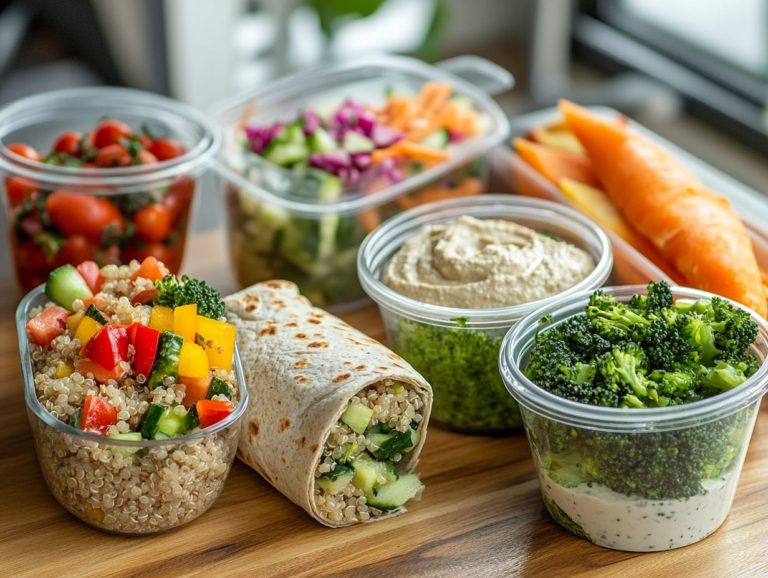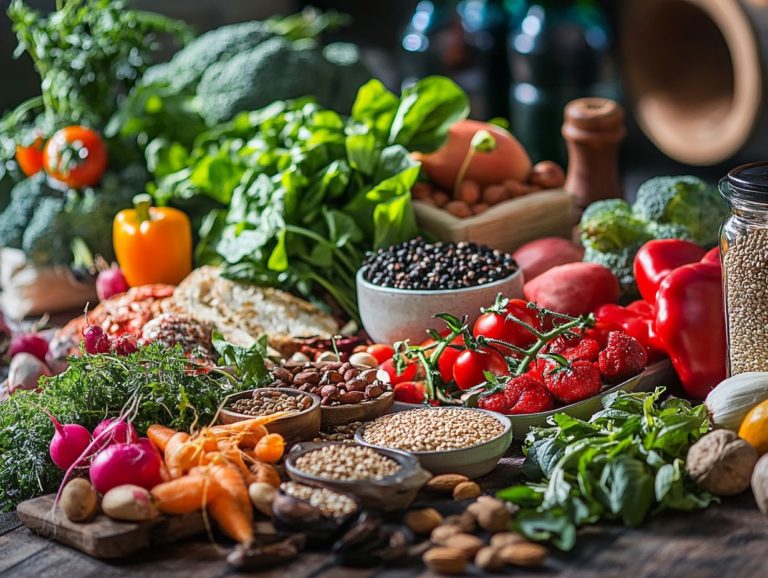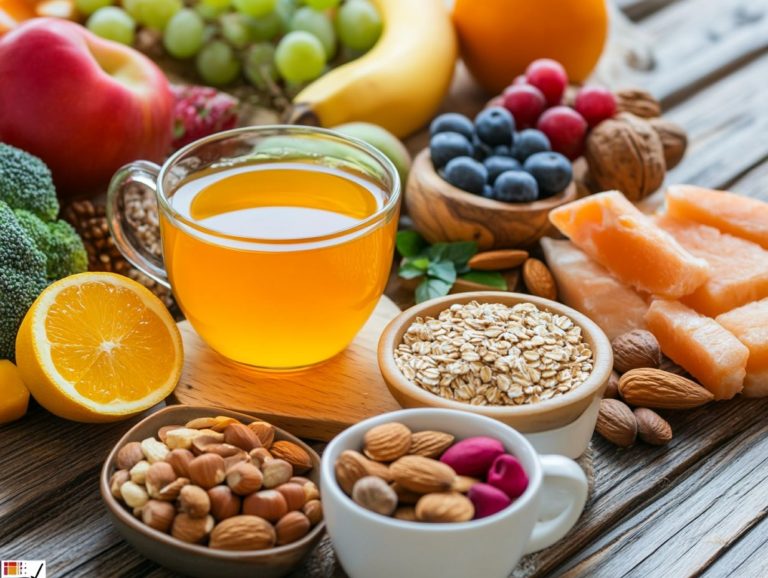Nutrition for Students: Brain Foods to Boost Focus
Good nutrition can be a game-changer for your academic success, especially when you’re balancing assignments and exams. This article delves into the key nutrients essential for optimal brain health.
We highlight the importance of omega-3 fatty acids, vitamins B and C, and crucial minerals like iron and zinc. To fuel your brain, consider incorporating foods such as fatty fish, leafy greens, nuts, and whole grains into your diet.
You will also find practical tips for meal planning and healthy snacking that can help you maintain focus and energy throughout your study sessions.
Contents
Key Takeaways:
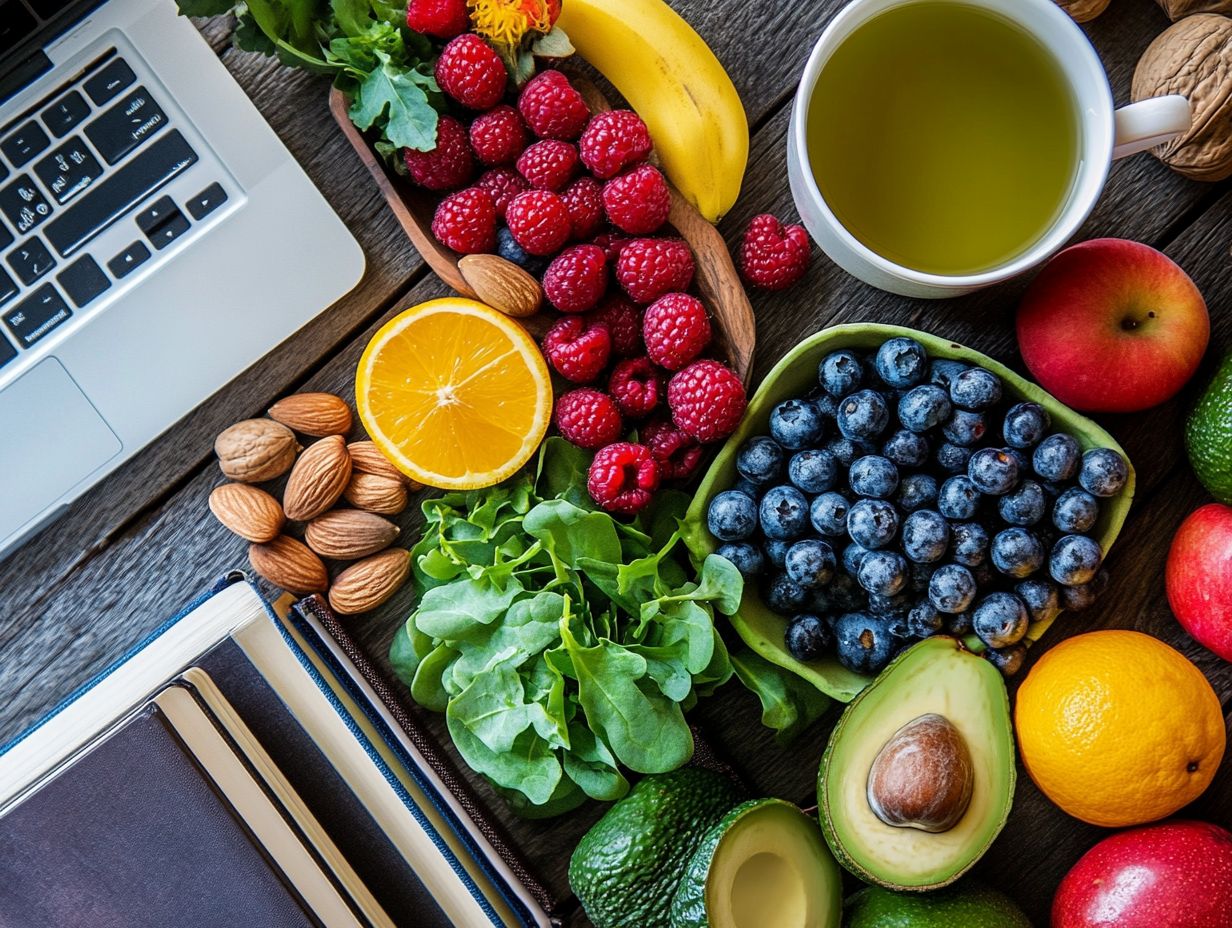
- Start eating brain-boosting foods like fatty fish and leafy greens today to improve your focus and academic performance.
- Key nutrients for brain health include omega-3 fatty acids, vitamins B and C, iron, and zinc.
- To maintain a healthy diet as a student, focus on meal planning and preparation, and choose healthy snack options.
The Importance of Proper Nutrition for Academic Performance
Proper nutrition plays a vital role in enhancing your academic performance. A balanced diet profoundly influences your cognitive function and mental agility.
Research shows that incorporating brain-boosting foods into your daily meals can enhance memory, sharpen focus, and promote overall brain health. Experts like Howard E. LeWine, MD, from Harvard Health Publishing, emphasize the importance of understanding the nutritional benefits of specific foods.
For students aiming to elevate their academic outcomes and mitigate cognitive decline, this knowledge is essential.
Key Nutrients for Brain Health and Focus
Key nutrients like omega-3 fatty acids, vitamins B and C, iron, and zinc are crucial for maintaining your brain health and enhancing your focus. These nutrients support cognitive function, impacting everything from memory enhancement to overall mental performance.
By integrating a diverse range of nutrient-dense foods that are rich in these vital vitamins and minerals, you can greatly enhance your brain health and set yourself up for academic success.
Omega-3 Fatty Acids
Omega-3 fatty acids are essential for your brain health. They have been shown to significantly enhance cognitive function. Incorporating sources like salmon and walnuts into your diet can be particularly beneficial.
Additionally, you can find other rich sources such as flaxseeds, chia seeds, and various leafy greens. This variety makes it easier for you to integrate these nutrient-dense options into your meals. Research suggests that omega-3s are instrumental in the development of neurons and synaptic plasticity, which bolster your memory and learning capabilities.
If you are managing a rigorous study schedule, snacking on a handful of mixed nuts or adding flaxseed to your morning smoothie offers a convenient and delicious way to boost your brain health. Prioritizing these healthy fats can enhance your focus and retention, paving the way for academic success.
Vitamins B and C
Vitamins B and C are essential for maintaining brain health. They provide crucial antioxidants that support cognitive function and enhance memory retention.
You can easily find these vitamins in a variety of fruits, vegetables, and whole grains, making it simple to incorporate them into your daily diet. For instance, vitamins B6, B12, and folate are vital for neurotransmitter synthesis, which helps your brain communicate effectively.
Meanwhile, vitamin C serves as a powerful antioxidant and plays a key role in producing neurotransmitters, boosting your focus and mental clarity. Incorporating foods rich in these vitamins, such as leafy greens, citrus fruits, nuts, and fortified cereals, can greatly enhance your brain function.
By prioritizing these nutrients, you can cultivate sharper cognitive abilities and improve your overall memory performance.
It s crucial to start integrating these foods into your diet right away. Make small changes by adding a few of these foods to your meals, and experience the difference in your academic performance!
Iron and Zinc
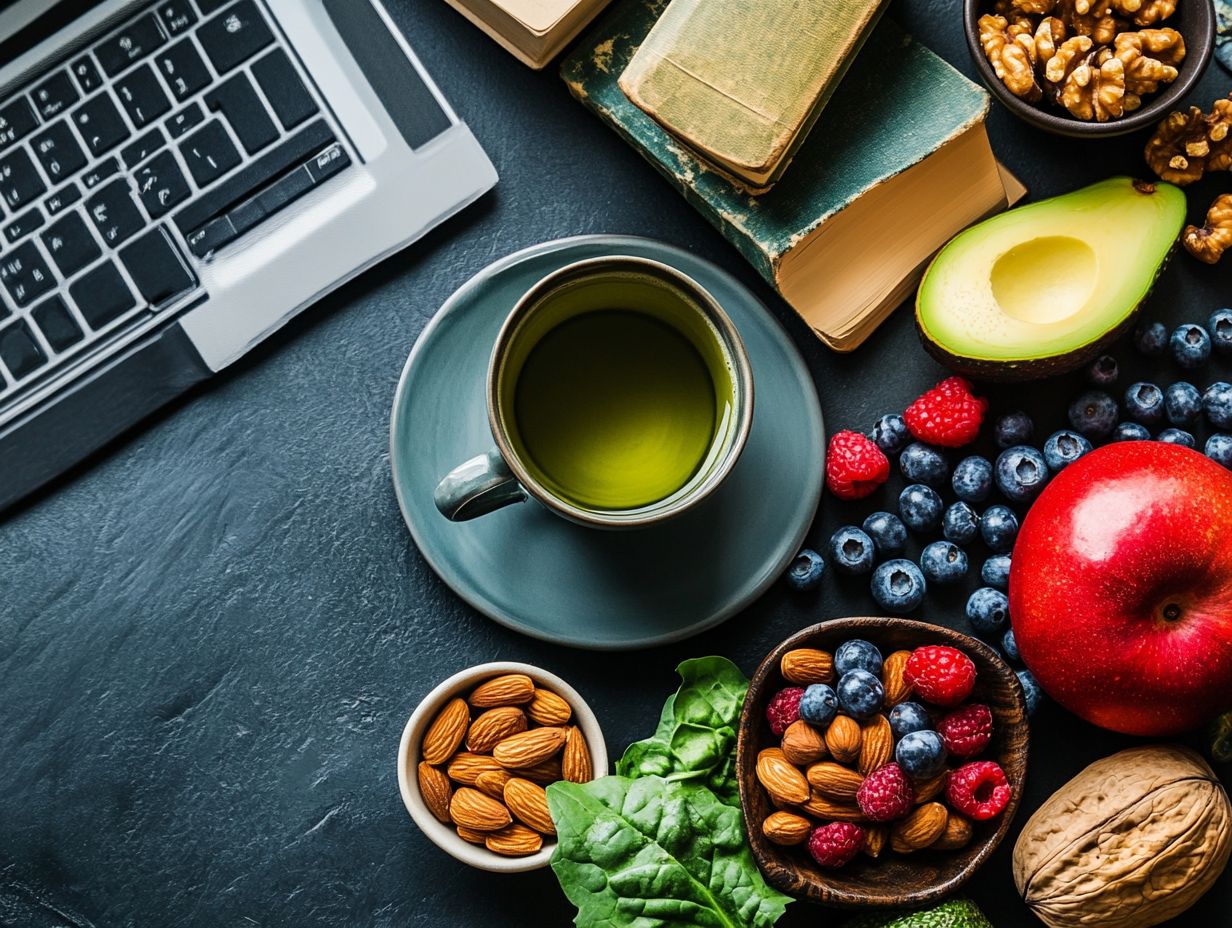
Iron and zinc are essential minerals that play a crucial role in brain health. They help stave off the gradual loss of brain function and maintain optimal cognitive performance. If you’re a student looking to boost your brainpower, make sure to include various protein sources rich in these minerals in your diet.
Each mineral has a unique yet complementary role in cognitive function. Iron is key for transporting oxygen in your bloodstream, which directly influences your energy levels and alertness. Zinc is vital for communication between brain cells and for maintaining neuronal health.
To boost your iron intake, make sure to include these dietary sources in your meals:
- Lean meats
- Beans
- Spinach
For zinc, look to include:
- Shellfish
- Seeds
- Whole grains
Incorporating these nutrient-rich foods into your daily diet not only supports cognitive development but also helps prevent cognitive decline. This is essential for anyone eager to sharpen their mental acuity and enhance overall brain health.
Top Brain Foods for Students
Incorporating brain foods into your diet can significantly boost your cognitive function and mental performance. Options like fatty fish, leafy greens, nuts, seeds, and whole grains can have a powerful impact on your brain health.
These nutrient-dense foods are packed with essential vitamins, minerals, and antioxidants, all vital for maintaining brain health and enhancing your academic success.
Fatty Fish
Fatty fish, especially salmon, are celebrated for their impressive omega-3 content. This nutrient plays a vital role in brain health and cognitive function. By regularly incorporating fatty fish into your meals, you can experience enhanced focus, improved memory retention, and overall better mental performance making it a crucial part of a student’s diet.
Need a quick meal? Try whipping up a salmon salad with fresh leafy greens, cherry tomatoes, and a light vinaigrette; it’s an easy lunch brimming with essential fatty acids. If you’re short on time, don’t overlook canned tuna or sardines. Simply toss them into your pasta or layer them on whole grain bread for a quick, nutritious snack.
With these delicious choices, enhancing your mental clarity through diet is not just possible it’s enjoyable.
Leafy Greens
Leafy greens are a treasure trove of antioxidants and vitamin K, both vital for maintaining cognitive function and supporting overall brain health. By including a diverse array of leafy greens in your meals, you’ll arm yourself with the essential nutrients needed to enhance your mental performance.
These vibrant vegetables are abundant in folate, iron, and omega-3 fatty acids, all of which play a crucial role in improving concentration and memory. For example, you can blend spinach and kale into smoothies, delivering a nutrient boost without overwhelming the flavor.
Alternatively, create salads that combine arugula, romaine, and Swiss chard. These can serve as a refreshing side dish or a satisfying main course. By swapping traditional starches for saut ed greens as a base for your proteins, you can relish both taste and health benefits, nourishing your brain while satisfying your hunger.
Start adding these brain-boosting foods today and supercharge your study sessions!
Nuts and Seeds
Nuts and seeds stand out as exceptional sources of healthy fats and protein, making them the perfect brain food for students eager to enhance brainpower. These nutrient-packed snacks not only support brain health but also provide the energy necessary for studying and tackling mental tasks.
By incorporating a variety of nuts, such as almonds, walnuts, and pistachios, along with seeds like chia and flax, you’ll optimize your nutritional intake. Rich in omega-3 fatty acids healthy fats found in foods like fish and nuts that help your brain work better these choices play a significant role in improving memory and focus.
You can easily enjoy a handful as a mid-morning snack or blend them into smoothies for an extra protein boost. For a well-rounded approach, pair nuts with fruits like apples or bananas to elevate your energy levels while keeping those pesky cravings at bay.
Aim for portions of about an ounce roughly a small handful to strike the right balance, ensuring you reap the health benefits without overindulging.
Whole Grains
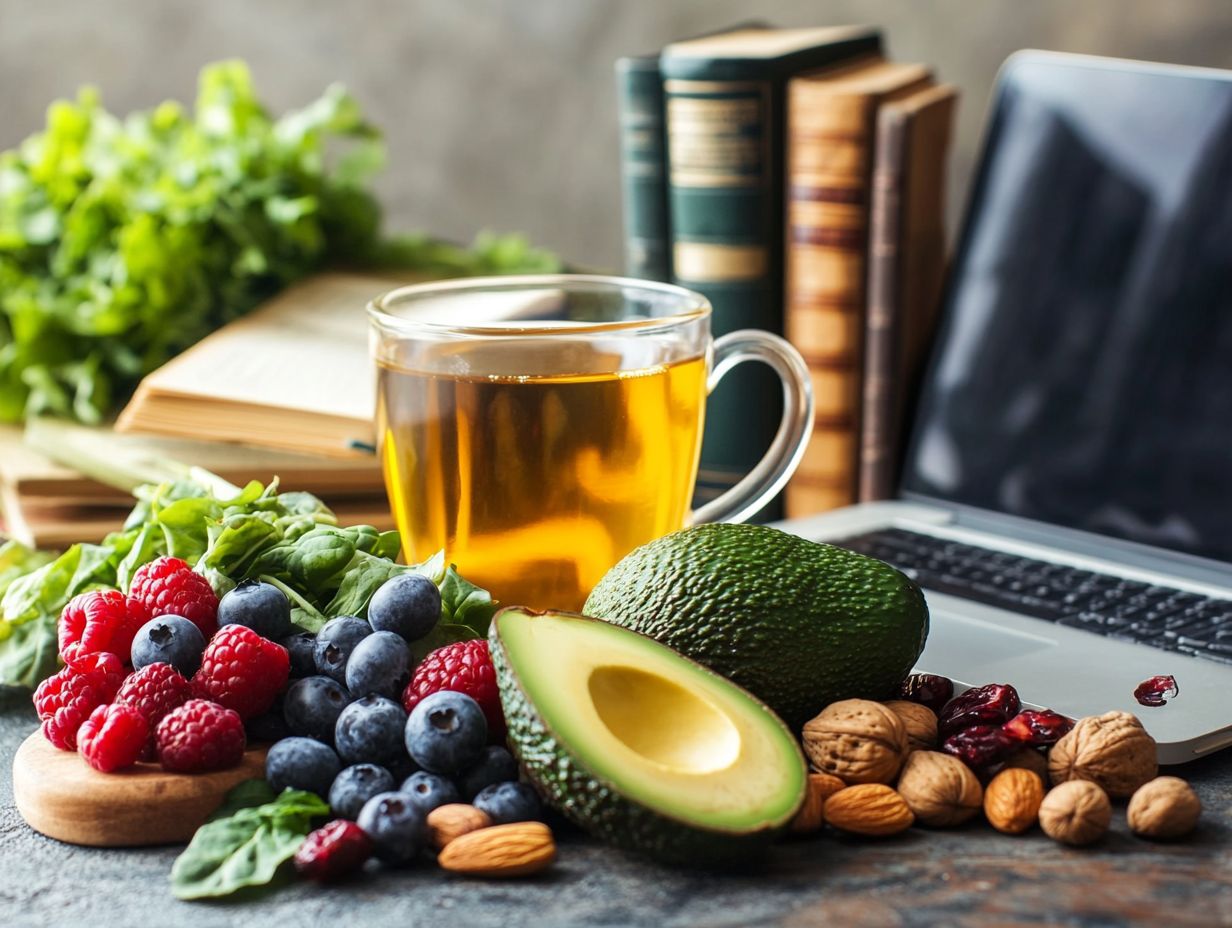
Whole grains are an essential part of your balanced diet, providing a steady source of energy and nutrients that promote healthy blood flow to your brain. Incorporating whole grains into your meals enhances your thinking ability and keeps you energized throughout your academic day.
Grains like brown rice, quinoa, oats, and whole wheat bread are rich in fiber, vitamins, and minerals. The fiber aids digestion and helps you maintain a feeling of fullness especially beneficial during those long study sessions.
To seamlessly weave these grains into your diet, consider the following:
- Prepare overnight oats for a nutritious breakfast.
- Opt for whole grain pasta during lunch.
- Enjoy a quinoa salad loaded with a variety of veggies.
Simple meal prep strategies, such as batch cooking grains, ensure that healthy options are always at your fingertips, making nutritious eating both convenient and satisfying.
Tips for Maintaining a Healthy Diet as a Student
Maintaining a healthy diet as a student demands a thoughtful approach to meal planning and preparation, ensuring that nourishing brain foods are always at your fingertips.
By taking the initiative to prepare nutritious meals and snacks, you’ll boost your brainpower effortlessly and enhance your overall well-being.
Meal Planning and Preparation
Effective meal planning is essential for students striving to maintain a healthy diet, especially when it involves incorporating brain foods that enhance thinking ability. Organizing your meals and grocery lists ensures that nutritious options are always readily available.
This proactive approach keeps you from resorting to last-minute fast food and saves you both time and money in the long run. Start by exploring simple, affordable recipes that fit your schedule and taste preferences to integrate brain foods like leafy greens, nuts, and fatty fish into your diet.
Preparing meals in advance perhaps dedicating Sundays to whip up a week s worth of lunches allows you to effortlessly enjoy healthy options during your busy weekdays.
Focus on brain-boosting foods, and you ll improve your grades while enjoying tasty meals!
Start today! Make these changes, and watch your brainpower soar!
Healthy Snack Options
Don t wait! Choosing healthy snacks now boosts your energy and focus throughout your busy day. By opting for brain foods like nuts, berries, and dark chocolate, you can provide your body with the necessary nutrients to stay focused and alert.
These snacks not only tantalize your taste buds but also deliver an impressive array of vitamins and minerals that contribute to overall brain health. For example, walnuts are rich in omega-3 fatty acids, known to enhance memory and cognitive performance. Incorporating fresh fruits like blueberries brings in antioxidants that combat oxidative stress, offering additional protection for your brain cells.
For those busy days, preparing a quick trail mix with a combination of seeds, dried fruit, and a few squares of dark chocolate fits perfectly into your backpack. This delightful treat not only satisfies your cravings but also provides sustained energy for studying or attending classes.
Frequently Asked Questions
What is nutrition for students?
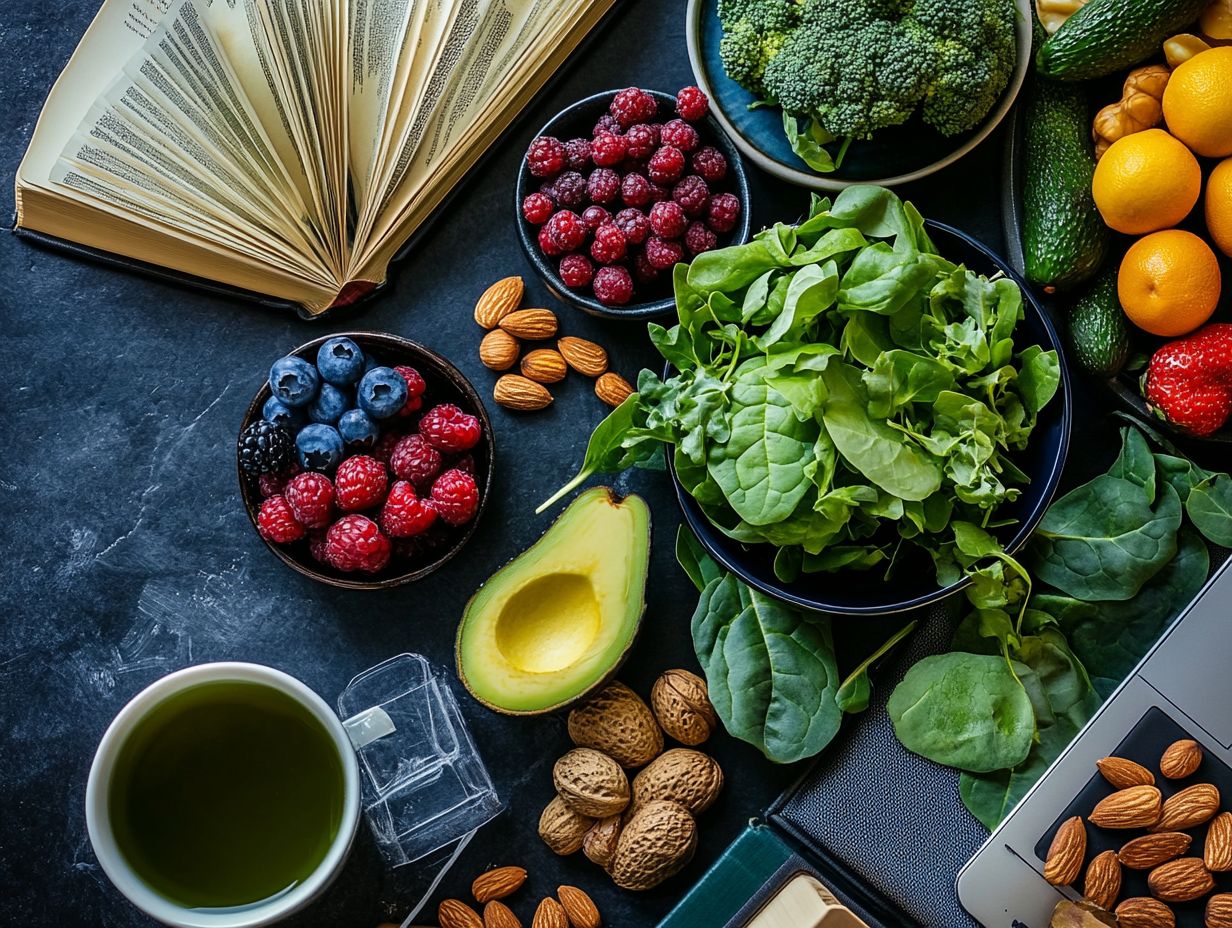
Nutrition for students refers to the intake of essential nutrients that support the growth and development of young minds and bodies. It involves consuming a balanced diet that provides all the necessary vitamins, minerals, and macronutrients (proteins, fats, and carbohydrates) to support physical and cognitive function.
Why is nutrition important for students?
Nutrition plays a vital role in a student s success! It directly impacts their physical, mental, and emotional well-being. It helps in maintaining a healthy body weight, boosts energy levels, improves focus and concentration, and strengthens the immune system.
What are brain foods?
Brain foods are foods that are rich in nutrients essential for proper brain function. These include foods high in omega-3 fatty acids, antioxidants, and vitamins and minerals such as B vitamins, iron, and zinc.
Which brain foods can help boost focus for students?
Some brain foods that can boost focus for students include fatty fish like salmon, blueberries, avocados, nuts and seeds, whole grains, and dark leafy greens. These foods provide important nutrients for brain health and can improve cognitive function.
How can students incorporate brain foods into their diet?
Students can incorporate brain foods into their diet by including them in meals and snacks throughout the day. For example, they can have a salmon and avocado sandwich for lunch, snack on a handful of nuts and berries, or mix nuts into their breakfast cereal.
What are some other tips for maintaining a healthy diet for students?
Include brain foods and eat regular meals and snacks for a healthier diet. Other tips include staying hydrated, limiting processed and sugary foods, including a variety of fruits and vegetables, and listening to hunger and fullness cues. It’s also important to consult a healthcare professional for individualized nutrition advice.


